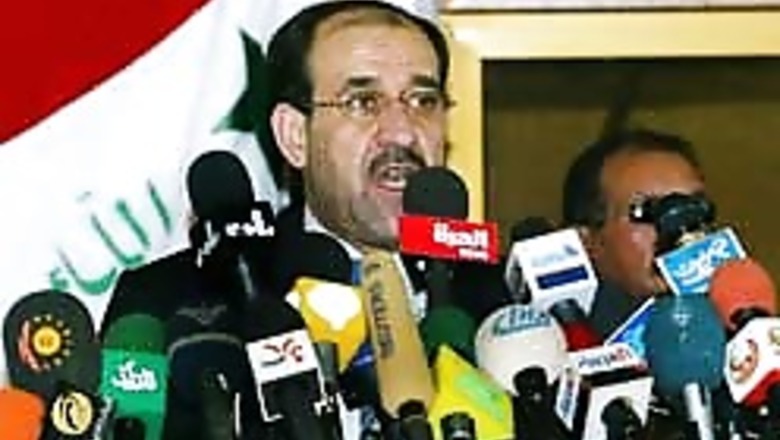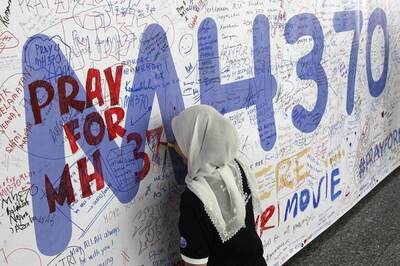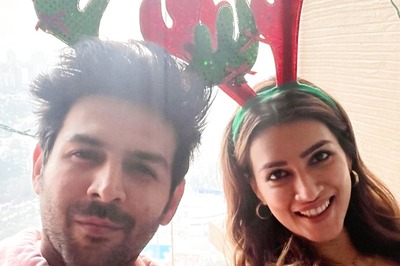
views
Basra (Iraq): Iraqi Prime Minister Nouri al-Maliki promised to crack down on sectarian gangs in Basra and declared a month-long state of emergency in the southern city on Wednesday amid increasing violence in the restive region.
Tensions have been worsening in the Shiite-dominated area, where Britain has about 8,000 soldiers, and mostly Shiite militias have been attacking Sunnis and battling each other.
Standing at a podium with an Iraqi flag as a backdrop, Al-Maliki issued a strong denunciation of a wave of killings and kidnappings that Sunni religious leaders have blamed on Shiite death squads.
"We shall use an iron fist against the leaders of the gangs or those who threaten security," he said, apparently referring to the militias as well as rival tribal groups. "And we shall ask all security departments to draw up an effective and quick plan to achieve security."
Al-Maliki was addressing about 700 tribal sheiks, religious leaders, officials, army officers and other residents in Basra, Iraq's second-largest city, 550 kilometers (340 miles) southeast of Baghdad.
Shouting broke out in the auditorium before al-Maliki delivered his speech, with several tribal leaders accusing local officials and security forces of being behind the mounting violence. But the prime minister calmed them down from the podium, saying ''we cannot negotiate with everybody shouting.''
Al-Maliki later declared a state of emergency in the southern city of Basra, amid mounting violence, said Sayed Muhammad al-Haidari, a top Shiite official who was traveling with the prime minister. A state of emergency also has been imposed on Baghdad, Diyala and Anbar.
Violence continued elsewhere, a day after car bombs targeting Shiite areas tore through a car dealership in southern Iraq and a bustling outdoor market north of Baghdad as attacks nationwide killed 54 people and wounded 120.
A parked car packed with explosives hit a police patrol in the northern Iraqi city of Mosul on Wednesday, killing at least five policemen and wounding 14, including a senior officer.
Jamal Kadhim Hassoun al-Zamili, former governor of Diwaniyah city south of Baghdad, was killed in a drive-by shooting late Tuesday that also wounded two of his guards, police Capt. Ali Hussein said.
And bomb hidden in an air conditioner exploded in the mayor's office in Muqdadiyah, about 60 miles north of Baghdad, killing the mayor, Sheik Allaywi Farhan al-Dulaimi, a member of the Sunni Iraqi Islamic Party, and wounding three of his guards, police said. Provincial Gov. Raad Rashid al-Mula Jawad imposed a curfew on the city and deployed Iraqi army forces there.
Gunmen killed a Shiite muazzin, the man who calls for the five daily prayers, as he was leaving his house to go to the Imam Ali Mosque in southwestern Baghdad, Hussein said.
A 25-year-old sportscaster for al-Iraqiya TV, Ali Jaafar, also was gunned down in a drive-by shooting near his house in southwestern Baghdad, police Lt Col Falah al-Mohammedawi said.
His death came two days after CBS correspondent Kimberly Dozier was seriously wounded and two crew members were killed in a bombing in Baghdad. Dozens of journalists have been killed since the US -led invasion of Iraq in March 2003.
PAGE_BREAK
A roadside bomb also hit a joint US -Iraqi patrol on the highway near the Dora Refinery in southern Baghdad and the area was blocked off, police Capt. Firas Geiti said. No casualties were immediately reported.
Another roadside bomb exploded near a convoy of Australian and Japanese troops in Samawa, about 370 kilometers (230 miles) southeast of Baghdad, wounding an Iraqi bystander and damaging an Australian military vehicle, according to Japanese news reports.
At least 19 bodies were found in separate locations in Baghdad, many blindfolded and handcuffed, apparent victims of sectarian killings often blamed on militias.
The Shiite prime minister traveled to Basra, Iraq's second-largest city, 550 kilometers (340 miles) southeast of Baghdad, with his Sunni Arab vice president, Tariq al-Hashimi.
Both leaders said security must be restored before prosperity could be restored to the port city strategically located on the Persian Gulf.
"There are future plans to improve Basra," al-Hashimi said. "But to prepare suitable circumstances, security must be restored and that is why we are here."
Iran's hand also is rumored to be behind Shiite militias in Basra, although little evidence of a direct link has been made public.
Nevertheless, US officials have long accused the Iranians - though not necessarily the Tehran government - of smuggling weapons to Shiite militias in Basra and perhaps also selling roadside bomb technology to Sunni militants - charges Iran denies.
"Basra is not exception from what is taking place in Baghdad, Anbar, Nineveh and Diyala," al-Hashimi said, referring to other volatile provinces.
''There are malignant campaigns and malignant intentions and there are malignant agendas to deepen divisions among Iraqis,'' he said. ''They intend to divide the country.''
In the months after the 2003 invasion, British troops enjoyed relative peace in southern Iraq compared with the restive Sunni regions further north.
But violence in the region has escalated. Nearly 140 people, most Sunnis but also Shiites and policemen, were killed in Basra this month alone, police Capt. Mushtaq Kadhim said.


















Comments
0 comment